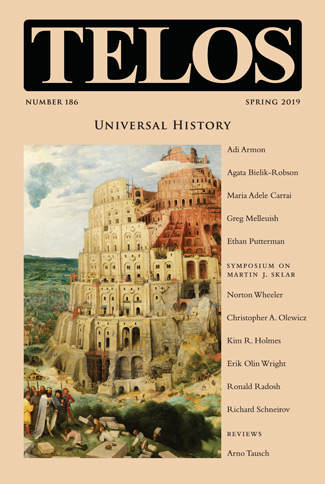Ethan Putterman’s “Locke and ‘War by Design’” appears in Telos 186 (Spring 2019). Read the full article at the Telos Online website, or purchase a print copy of the issue in our online store. Individual subscriptions to Telos are available in both print and online formats.
 Few passages in John Locke’s writings are more controversial than the incongruous descriptions of the state of nature in chapters III and IX of the Second Treatise on Government. A hodgepodge of opposites where men live at once in a “State of Peace, Good Will, Mutual Assistance, and Preservation” yet remain “very unsafe, very unsecure,” Locke’s state of nature is, according to John Dunn, “probably the most misunderstood idea in the English radical’s political philosophy.” In this article, I explore Locke’s epistemology behind humankind’s comprehension of natural law to argue that his state of nature is more consistent than appears. I demonstrate that the symmetry of the philosopher’s state of nature is best understood by way of the theory of knowledge in his Essays on the Law of Nature and Essay Concerning Human Understanding.
Few passages in John Locke’s writings are more controversial than the incongruous descriptions of the state of nature in chapters III and IX of the Second Treatise on Government. A hodgepodge of opposites where men live at once in a “State of Peace, Good Will, Mutual Assistance, and Preservation” yet remain “very unsafe, very unsecure,” Locke’s state of nature is, according to John Dunn, “probably the most misunderstood idea in the English radical’s political philosophy.” In this article, I explore Locke’s epistemology behind humankind’s comprehension of natural law to argue that his state of nature is more consistent than appears. I demonstrate that the symmetry of the philosopher’s state of nature is best understood by way of the theory of knowledge in his Essays on the Law of Nature and Essay Concerning Human Understanding.


